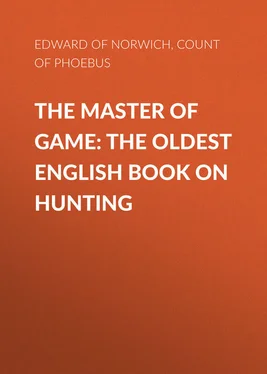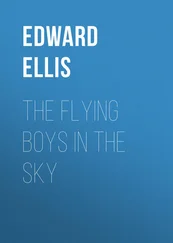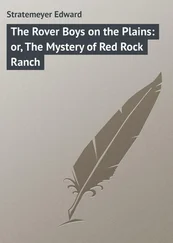Edward Array - The Master of Game - The Oldest English Book on Hunting
Здесь есть возможность читать онлайн «Edward Array - The Master of Game - The Oldest English Book on Hunting» — ознакомительный отрывок электронной книги совершенно бесплатно, а после прочтения отрывка купить полную версию. В некоторых случаях можно слушать аудио, скачать через торрент в формате fb2 и присутствует краткое содержание. Жанр: Хобби и ремесла, foreign_antique, foreign_prose, на английском языке. Описание произведения, (предисловие) а так же отзывы посетителей доступны на портале библиотеки ЛибКат.
- Название:The Master of Game: The Oldest English Book on Hunting
- Автор:
- Жанр:
- Год:неизвестен
- ISBN:нет данных
- Рейтинг книги:5 / 5. Голосов: 1
-
Избранное:Добавить в избранное
- Отзывы:
-
Ваша оценка:
- 100
- 1
- 2
- 3
- 4
- 5
The Master of Game: The Oldest English Book on Hunting: краткое содержание, описание и аннотация
Предлагаем к чтению аннотацию, описание, краткое содержание или предисловие (зависит от того, что написал сам автор книги «The Master of Game: The Oldest English Book on Hunting»). Если вы не нашли необходимую информацию о книге — напишите в комментариях, мы постараемся отыскать её.
The Master of Game: The Oldest English Book on Hunting — читать онлайн ознакомительный отрывок
Ниже представлен текст книги, разбитый по страницам. Система сохранения места последней прочитанной страницы, позволяет с удобством читать онлайн бесплатно книгу «The Master of Game: The Oldest English Book on Hunting», без необходимости каждый раз заново искать на чём Вы остановились. Поставьте закладку, и сможете в любой момент перейти на страницу, на которой закончили чтение.
Интервал:
Закладка:
The hare cannot be judged, either by the foot or by her fumes (excrements), for she always crotieth 18 18 Casting her excrements.
in one manner, except when she goeth in her love that hunters call ryding time, for then she crotieth her fumes more burnt (drier) and smaller, especially the male. The hare liveth no long time, for with great pain may she pass the second 19 19 A mistake of the old scribes which occurs also in other MSS.; it should, of course, read "seventh" year. G. de F. has the correct version.
year, though she be not hunted or slain. She hath bad sight 20 20 G. de F. says: "She hears well but has bad sight," p. 43.
and great fear to run 21 21 "Fear to run" is a mistake occasioned by the similarity of the two old French words "pouair," power, and "paour" or fear. In those of the original French MS. of G. de F. examined by us it is certainly " power" and not "fear." Lavallée in his introduction says the same thing. See Appendix: Hare.
on account of the great dryness of her sinews. She windeth far men when they seek her. When hounds grede of her (seek) and quest her she flieth away for the fear that she hath of the hounds. Sometimes men find her sitting in her form, and sometimes she is bitten (taken) by hounds in her form before she starts. They that abide in the form till they be found are commonly stout hares, and well running. The hare that runneth with right standing ears is but little afraid, and is strong, and yet when she holdeth one ear upright and the other laid low on her ryge (back), she feareth but little the hounds. An hare that crumps her tail upon her rump when she starteth out of her form as a coney (does) it is a token that she is strong and well running. The hare runneth in many diverse manners, for some run all they are able a whole two miles or three, and after run and ruse again and then stop still when they can no more, and let themselves be bitten (by the hounds), although she may not have been seen all the day. And sometimes she letteth herself be bitten the first time that she starteth, for she has no more might (strength). And some run a little while and then abide and squat, and that they do oft. And then they take their flight as long as they can run ere they are dead. And some be that abide till they are bitten in their form, especially when they be young that have not passed half a year. Men know by the outer side of the hare's leg if she has not passed a year. 22 22 See Appendix: Hare.
And so men should know of a hound, of a fox, and of a wolf, by a little bone that they have in a bone which is next the sinews, where there is a little pit (cavity).
Sometimes when they are hunted with hounds they run into a hole as a coney, or into hollow trees, or else they pass a great river. Hounds do not follow some hares as well as others, for four reasons. Those hares who be begotten of the kind of a coney, as some be in warrens, the hounds lust not, nor scenteth them not so well. The other (is) that the fues (footing) of some hares carry hotter scent than some, and therefore the hounds scenteth of one more than of the other, as of roses, some smell better than others, and yet they be all roses. The other reason is that they steal away ere they be found, and the hounds follow always forth right. The others run going about and then abide, 23 23 G. de F. has: "vonts riotans tournions et demourant," i. e. run rioting, turning and stopping, p. 44.
wherefore the hounds be often on stynt (at fault). The other (reason) is according to the country they run in, for if they run in covert, hounds will scent them better than if they run in plain (open) country, or in the ways (paths), for in the covert their bodies touch against the twigs and leaves, because it is a strong (thick) country. And when they run in plain country or in the fields they touch nothing, but with the foot, and therefore the hound can not so well scent the fues of them. And also I say that some country is more sweet and more loving (to scent) than another. The hare abideth commonly in one country, and if she hath the fellowship of another or of her kyndels or leverettes, they be five or six, for no strange hare will they suffer to dwell in their marches (district), though they be of their nature (kind), 24 24 Both the Vespasian and the Shirley MS. in the British Museum have the same, but G. de F., p. 45, has, "except those of their nature" ( fors que celle de leur nature ).
and therefore men say in old saws: "Who so hunteth the most hares shall find the most." For Phebus the Earl of Foix, that good hunter, saith that when there be few hares in a country they should be hunted and slain, so that the hares of other countries about should come into that march.
Of hares, some go faster and be stronger than others, as it is of men and other beasts. Also the pasture and the country where they abide helpeth much thereto. For when the hare abideth and formeth in a plain country where there are no bushes, such hares are commonly strongest and well running. Also when they pasture on two herbs – that one is called Soepol (wild thyme) and that other be Pulegium (pennyroyal) they are strong and fast running.
The hares have no season of their love for, as I said, it is called ryding time, for in every month of the year that it shall not be that some be not with kindles (young). Nevertheless, commonly their love is most in the month of January, and in that month they run most fast of any time of the year, both male and female. And from May unto September they be most slow, for then they be full of herbs and of fruits, or they be great and full of kindles, and commonly in that time they have their kindles. Hares remain in sundry (parts of the) country, according to the season of the year; sometimes they sit in the fern, sometimes in the heath, sometimes in the corn, and in growing weeds, and sometimes in the woods. In April and in May when the corn is so long that they can hide themselves therein, gladly will they sit therein. And when men begin to reap the corn they will sit in the vines and in other strong (thick) heaths, in bushes and in hedges, and commonly in cover under the wind and in cover from the rain, and if there be any sun shining they will gladly sit against the beams of the sun. For a hare of its own kind knoweth the night before what weather it will be on the next morrow, and therefore she keepeth herself the best way she may from the evil weather. The hare beareth her kindles two months, 25 25 This is incorrect: the hare carries her young thirty days (Brehm, vol. ii. p.626; Harting, Ency. of Sport , vol. i. p. 504).
and when they are kindled she licketh her kindles as a bitch doeth her whelps. Then she runneth a great way thence, and goeth to seek the male, for if she should abide with her kindles she would gladly eat them. And if she findeth not the male, she cometh again to her kindles a great while after and giveth them to suck, and nourisheth them for the maintainance of 20 days or thereabouts. A hare beareth commonly 2 kindles, but I have seen some which have kindled at once sometime 6, sometime 5 or 4 or 2; 26 26 Should read "three" (G. de F., p.47).
and but she find the male within three days from the time she hath kindled, she will eat her kindles. And when they be in their love they go together as hounds, save they hold not together as hounds. They kindle often in small bushes or in little hedges, or they hide in heath or in briars or in corn or in vines. If you find a hare which has kindled the same day, and the hounds hunt after her, and if you come thither the next morrow ye shall find how she has removed her kindles, and has borne them elsewhere with her teeth, as a bitch doth her whelps. Men slay hares with greyhounds, and with running hounds by strength, as in England, but elsewhere they slay them also with small pockets, and with purse nets, and with small nets, with hare pipes , and with long nets, and with small cords that men cast where they make their breaking of the small twigs when they go to their pastures, as I have before said. 27 27 See Appendix: Snares.
But, truly, I trow no good hunter would slay them so for any good . When they be in their heat of love and pass any place where conies be, the most part of them will follow after her as the hounds follow after a bitch or a brache.
Интервал:
Закладка:
Похожие книги на «The Master of Game: The Oldest English Book on Hunting»
Представляем Вашему вниманию похожие книги на «The Master of Game: The Oldest English Book on Hunting» списком для выбора. Мы отобрали схожую по названию и смыслу литературу в надежде предоставить читателям больше вариантов отыскать новые, интересные, ещё непрочитанные произведения.
Обсуждение, отзывы о книге «The Master of Game: The Oldest English Book on Hunting» и просто собственные мнения читателей. Оставьте ваши комментарии, напишите, что Вы думаете о произведении, его смысле или главных героях. Укажите что конкретно понравилось, а что нет, и почему Вы так считаете.












